Tipu Sultan and his ‘Indian Dream’
A lot has been said of Tipu Sultan. Why does the so-called-debate pop up every third week of November? The newspapers in Karnataka and the rest of India have been filled with stories of the Mysorean ruler, trying to place him in an India that is increasingly gripped by frequent doses of ‘Ultra Nationalism’. The death of two Vishwa Hindu Parishad (VHP) cadres after a peaceful march on the occasion of Tipu’s birth anniversary in Kodagu, Karnataka turned ugly is a case in point.
‘Is Tipu Sultan a tyrant or a hero’, read the title of an article on him on the internet. While there is one group trying to pay its respects to the ruler of the erstwhile princely state of Mysore, there is another bent on bringing him down and tarnishing his reputation. To begin with, binaries in the debate- the black and white nature of the discourse-do not do justice to the man. Many of them have taken it on themselves to describe and historicize the Sultan, popularly called the ‘Tiger of Mysore’. The other day, my friend jokingly quipped, ‘Poor Tipu! He only ruled for so long and little would he have predicted the decade-long dispute that has followed him. It is now three centuries since Tipu has fallen, a brave, untimely death at the hands of the British.
Girish Karnad, noted author, theater and film personality who wrote the Kannada play Tippuvina Kanasugalu (The Dreams of Tipu Sultan) was forced to apologize to the public recently. ‘I expressed an opinion that just like the airport in Kolkata is named after Subhash Chandra Bose, the airport in Bangalore could be named after Tipu’. Tipu Sultan, the only ruler from India to die fighting on the war front against the British was born in Devanahalli, the current location of the airport.
Tipu Sultan is one of the unfortunate rulers on whom straight forward history or literature, leave alone hagiographical or appreciative modern accounts, is hard to come by. The fact that the name evokes mixed responses from the general public shows how little Indians care to know about our own history. Since there have already been a lot said on the religious or spiritual side of Tipu, focussing on the Social and Administrative reforms that the Sultan brought in during his reign might bring about a more nuanced understanding of the man.
Zeal for Administration:
To begin with, the time and age in which Tipu Sultan was a ruler is to be foregrounded. It is the late 18th century and like other Indian rulers of the time, he was an autocrat. The Sultan was the supreme legislative, executive and judicial authority in his kingdom. He was his own foreign minister and personally dictated all important correspondences. The leader in him went as far as the war fronts as well. Tipu led from the front and commanded the principal army. The generals who were sent out had to wait for his instructions too. All this did not mean he was an irresponsible ruler with regard to the social front. He had a high sense of duty to his office and believed that his subjects ‘constitute a unique trust held for God, the real Master.’ He spared no pains to promote the welfare of the people either and he was busy all day with various affairs of the state.
Tipu Sultan personally supervised every department of the government, and endeavoured to check
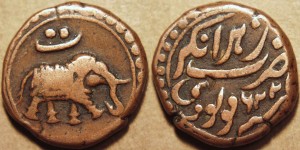
Tipu Sultan (1782-1799) AE Paisa, Nagar, AM 1226
Caparisoned elephant walking right, Persian letter Te above Persian legend stating mint Nagar.
the laxity, oppression and peculation of the officers by inflicting upon them exemplary punishments. In the words of Mackenzie, Tipu ‘invigorated the whole system by principles of good government, and by an economic management of material resources to which those of any neighbouring power bore no comparison…’ The frauds of intermediate agents were dealt with severe and exemplary punishments, says Mohibbul Hassan in his book History of Tipu Sultan (1951). The Sultan protected the Raiyats (a peasant or agricultural labourer), who were chiefly of Hindu religion, from the enormities of the black collectors. The Government’s activity was much wider than that of other Indian states. Most of the rulers were mainly interested in maintaining law and order and in defending their countries from invasion. Seeing that that some European countries owed their greatness to commerce and trade, Tipu took on himself the role of ruler in that respect. He played all at once the roles of a trader, banker, manufacturer and money-changer. Mohibbul Hassan compares Tipu to Muhammad Ali, the founder of Modern Egypt.
Sultan was constantly bent on promoting the welfare of the people and eventually adopted the role
of a social reformer too. He banned the use of liquor and all other intoxicants in the kingdom. The French, with whom Tipu had joined forces, were permitted to open a shop in the camp for the French soldiers in the Mysore army. He prohibited persons of illegitimate or slave birth from marrying into respectable families. He forbade prostitution and the employment of female slaves in domestic service, and tried to stop the Nair practice of polyandry in Malabar and Coorg. At that time, women did not cover themselves above the waist and so Tipu decreed that no woman should go outside the house naked. One may notice the changing trends when it comes to trends in attire here. He also abolished the custom of human sacrifice which was practiced in the temple of Kali Devi in Mysore town. Tipu’s government was highly centralized. While detailed instructions were sent which they were required to follow, the officers were reprimanded if the ministers followed it too literally and did not act on their responsibilities.
Tipu called his government Sarkar-i-Khudadad (Government given by God). This was not meant only for Muslims. While the Sharia’ law was applicable to the Muslims, Hindus were governed by their own laws which Tipu never interfered with. So, rather than being theocratic, Tipu’s rule was adopting the model of a God-oriented governance.
The age-long system of village panchayats were allowed to function without any hindrance. ‘The Mysore Government’, wrote Munro in 1790, ‘is the most simple and despotic monarchy in the world, in which every department, civil and military, possesses the regularity and system, communicated to it by the genius of Hyder and in which all pretensions derived from high birth being discouraged, all independent chiefs and zamindars being subjugated and extirpated, justice severely and impartially administered, a numerous and well administered army kept up and almost every department of trust or consequence conferred on men raised from obscurity, gives the government a vigour hitherto unexampled in India.’
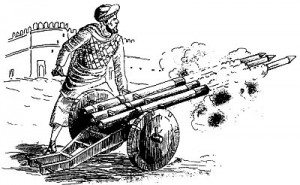
Mysorean rockets were pioneering Indian weapons as they were the first iron-cased rockets that were successfully deployed for military use in the world.
Similarly Moor, on the basis of personal experience, wrote, ‘ When a person travelling through a strange country finds it well cultivated, populated with industrious inhabitants, cities newly founded, commerce extending, towns increasing, and everything flourishing as to indicate happiness, he will naturally conclude it to be under a form of government congenial to the minds of the people. This is a picture of Tippoo’s country, and this is our conclusion respecting its government.’
Dreams of Tipu:
People today would be familiar with the great psychoanalyst who goes by the name of Sigmund Freud. He found a psychological technique that makes it possible to interpret dreams. Freud’s book, ‘On Dreams’ begins like this, ‘In the following pages, I shall demonstrate that there exists a psychological technique by which dreams may be interpreted and that upon the application of this method every dream will show itself to be a senseful psychological structure which may be introduced into an assignable place in the psychic activity of the waking state.’
At the same time, it is a known fact that Islam has a long and a rich history of dream interpretation. Medieval philosopher-theologians like Ibn Arabi (1164-1240) and Ibn Khaldun (1332-1402) developed the earlier teachings of Ibn Sirin (d. 728). According to one of the views on dreams, the best dreams are those coming directly from God, clear and without symbolic ambiguity. Such dreams find a mention in the Qur’an and the hadiths, the sayings of the Prophet Muhammed mentioned by his earliest followers. The dreams with bizarre, emotionally upsetting or morally improper contents are classified as demonic. The individual who has such dreams is encouraged to ignore them. According to Ibn Khaldun, ‘confused dreams’ are from Satan, because they are futile and Satan is the source of futility. On the other hand, according to Ibn Arabi, a dream or khayal is that which represent something between the real and phenomenal worlds, as do our imaginings. He also represents khayal as anything that provides a symbol for either reality or for some hidden meaning.
Many Muslims in the contemporary world still pay close attention to their dreams hoping for signs of divine favour and guarding against demonic temptations. A study of dreams can make key inroads in the understanding of Muslim culture and in the topic of historical continuity from the religions founding through its ‘golden age’ to its present age.
In a similar vein, we stumble upon an interesting manuscript at the India Office Records, British Library. The document titled ‘Dreams of Tipu’ kept by the East India Company contains Tipu Sultan’s dreams in his own hand writing. It was discovered by Colonel Kirkpatrick in the Sultan’s bed chamber after the fall of Srirangapatnam, in 1799. Tipu is said to have had a peculiar anxiety while he was reading or writing in it. There are 37 dreams recorded in the book and majority of them concerns the British and their allies. It is translated from the original Persian, the preferred court language during the time. In some of the dreams, he interprets them himself. The book includes certain memoranda that relate to some of the events in his life.
Adapting one or two dreams of Tipu should give us an idea on how much of a freedom-loving
administrator he really was. In the first dream, which has been narrated crisply and is an example of clarity and epigrammatic brevity of all his dream narrations, Tipu sees himself as challenging a Muslim officer in the Marhatta army for a dual and killing him at a stroke. It reveals bravery and courage of Tipu as well as his fantasy and ambition. Dream two involves him sighting the crescent the day before Id. It is one of the shorter additions in the diary.
Further additions involve ‘Seating a King on the throne of Delhi’ where Tipu dreams of placing a general from another army as well as one of his own generals, Qutbuddin, to encamp in front of the ‘unbelievers’. In his own words, if God wills, he would seat a king on the throne in Delhi which in turn would give strength to Islam. And this statement could be interpreted either way. But it is very important to understand who he is referring to as the unbelievers here. The ‘Marhattas,’ who have been glamourized and valorised after the emergence of the Hindutva ultra-nationalists, had their own imperial agendas and objectives. To claim one of the Kingdoms as more tolerant in religion than the other is to read history out of context and for the vagaries of the present themes and pre-occupations. There was no concept of ‘India’ as a nation state then and our land was but a collection of mutually repellent princely states and different rulers.
The collection of dreams also include a story of the ‘Pitcher of Milk’ presented to him by Rama Nayar , a leader of the Malabar insurgents, and a brief mention of the Sultan tasting the sweet and refreshing coconut water in ‘The Sea Coconuts’. The ‘Line of Entrenchments’ show us the passion that made the man and the wonderful strategist in him during key moments of war. The dream where Tipu receives relics from Hadrat Bandah-Nawaz is one of the few written records that reveal the spiritual side in him. There is a lot of other more visible forms of evidence that point to the ‘secular’ (in its diluted sense of religious neutrality) nature of the Sultan’s reign, i.e. the temples he built in every fort or place that he ruled from. But we had decided not to delve into sensitive topics and it is better left to the historians to dissect and interpret.
According to the translator of the book ‘Dreams of Tipu’, Tipu Sultan has been eulogized through the ages for the wrong reasons. While the court historians praise his scholarship and literary skill, the British historians have reviled his character. The British accepted their contention with regard to his scholastic attainments while the author here is of the opinion that the facts prove otherwise. Tipu Sultan, from the age of fifteen onward was seen accompanying his father in the various wars that he fought. Naturally, Tipu could not receive a systematic education of the type he might have received had he lived elsewhere. Tipu can be admired for the many innovations he brought in India. He deserves to be understood as a ruler that preceded the imagination of a pluralist India; an India that we love to imagine, an India devoid of religious barriers or divisive politics.
The dominant note throughout his dreams, is what was uppermost in Tipu Sultan’s mind – how to free his country from foreign rule. A student of history may find this of great importance to note how Tipu Sultan interpreted his dreams and how it influenced his actions. From the book it becomes clear how the Sultan’s hours of sleep were as devoted to the cause of freedom as the hours while he was awake. In the meantime, the Sultan’s ‘Indian dream’ lives on…


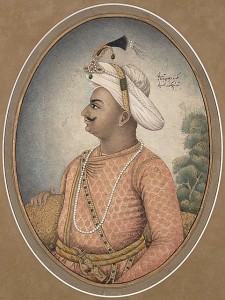

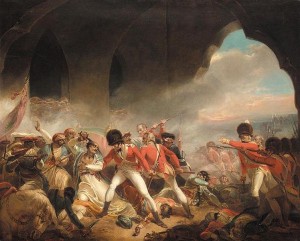

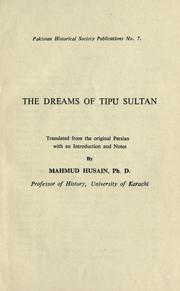




















Connect
Connect with us on the following social media platforms.